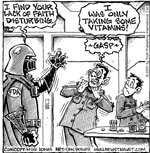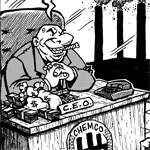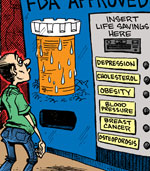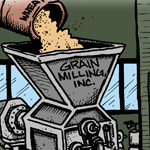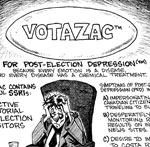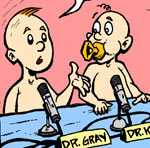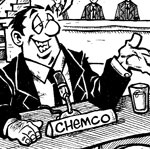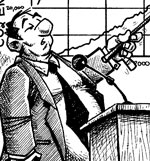Genital Warts in Men
| Share on Facebook | Share on Twitter | Share on Google+ |
Epidemiologists estimate than over 10 million men in the United States alone are already infected with the virus that causes genital warts, and that up to another 3 million men each year will be infected. There are over 80 human papillomaviruses (HPV) that can cause genital warts in men, only four of which are included in the Gardasil vaccine.
Recognizing Genital Warts in Men
HPV infections in men are less likely to result in visible genital warts. Sometimes there is just itching, inflammation, and discharge. It can take up to three months after an infection for warts to appear, and up to 50% of men who carry HPV don't ever develop visible warts.
Diagnosing Genital Warts
Doctors usually diagnose HPV infection by spraying an acid on the penis that makes infected skin whiter than surrounding skin. The vinegar-like acid is not especially painful, although it can cause temporary itching, especially when men do not follow their doctor's directions regarding immediate washing to remove it.
When warts appear, they are usually small, fleshy, pinkish, cauliflower-shaped growths on the tip of the penis. A different strain of HPV can cause similar growths on the shaft of the penis. Warts may spread to the anus even when men do not have anal sex, but men who receive anal sex may also develop warts inside the rectal canal.
Spreading The Disease
The more sexual partners men have, the more likely they are both to catch and to spread the virus. Men can spread the warts to their sex partners even if they use condoms, although condoms greatly reduce the rate of infections. Warts on the tip of the penis can infect "wet" surfaces in the vagina, cervix, rectum, and soft tissues of the mouth, while warts on the shaft of the penis can spread infection to the outside of the body of the sex partner where they come in contact with skin. It is not impossible to get genital warts on the fingers and hands. Various forms of HPV can cause cancers of the skin, penis, anus, rectum, cervix, throat, and eyes. There are four forms of HPV that can cause melanoma.
The Whack and Burn Approach to Genital Warts Treatment
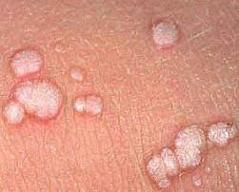 Doctors usually treat genital warts by whacking 'em off, with an electric needle, freezing them with liquid nitrogen, or burning them with trichloroacetic acid. You'd probably be told, "Oh, it's just acetic acid, like apple cider vinegar," but it's not. If you spill vinegar on your pants there is no danger your penis will fall off. You will undoubtedly want to rinse off trichloroacetic acid the doctor uses to remove warts.
Doctors usually treat genital warts by whacking 'em off, with an electric needle, freezing them with liquid nitrogen, or burning them with trichloroacetic acid. You'd probably be told, "Oh, it's just acetic acid, like apple cider vinegar," but it's not. If you spill vinegar on your pants there is no danger your penis will fall off. You will undoubtedly want to rinse off trichloroacetic acid the doctor uses to remove warts.Medical science also offers various forms of chemotherapy and immunotherapy for male genital warts. If you would like to discuss nutritional support while taking the very appropriately named 5-FU or interferon injections (into the warts on the penis), talk with your doctor. But probably you would be more interested in nutritional support.
Slowing Down Genital Warts With Nutrition
Because cervical cancer caused by HPV is much more common than penile cancer caused by HPV, researchers know a lot more about how to use nutrition to stop the progress of HPV in women than they know about how to use nutrition to stop the progress of HPV in men. In men, the dynamics of nutrition and HPV are somewhat more complex:
- A study at the Fred Hutchinson Cancer Research Center in Seattle found that men who are infected with HPV are more likely to develop genital warts if they are moderate to heavy drinkers of alcohol.
- A study at the University of California at Los Angeles found that men who smoke are more likely to develop genital warts after HPV infection than men who do not.
- HPV can interact with herpes to trigger cancers of the penis, anus, and the skin on the scrotum and crotch. Beta-carotene, the antioxidant found in carrots, winter squash, pumpkin, and certain kinds of algae, stops the chemical changes induced by the herpesvirus on HPV.
- Vitamin A was a standard treatment for genital warts in men in the former Soviet Union.
- German researchers have found that "high" consumption of pork products is associated with the development of genital warts, although they were referring to consumption of 600 to 1,000 grams (1-2 pounds) of sausage and ham daily. Germans typically eat smoked pork products without cooking them.
- A study at the University of the Free State in Bloemfontein in the Republic of South Africa linked the development of oral warts caused by HPV to deficiencies in essential fatty acids, manganese, magnesium, and zinc.
- Studies of men in Brazil have found lower rates of genital warts in men who consumed more vitamin C in their diets.
- Finnish studies of men who perform oral sex on men have found that throat cancer rates are lower when there are more vegetables in the diet.
- And, making it harder to make sense of the data, a study at the Harvard School of Public Health found that fruit consumption increased the risk of neck and throat cancer in people who tested positive for the HPV-16 virus, but decreased the risk of neck and throat cancer in people who were not.
There has been a great deal of research into the use of B vitamins, vitamin C, vitamin E, and zinc in treating genital warts in men. It's highly likely that the same recommendations typically made for women would also apply to men, but there is no guarantee that they slow the development of genital warts. Still, preventing deficiencies (without any need to take expensive megadoses of any nutrient) seems prudent. Here is a typical nutritional program for preventing the progression of genital warts in men.
- Beta-carotene: 200,000 IU per day.
- Fish oil, 1,000 mg per day, or flaxseed oil, 3,000 mg per day.
- Folic acid: 2.5 mg per day.
- Magnesium, 400 mg per day.
- Manganese, 2 mg per day (especially if you take magnesium, since magnesium makes manganese less available to the body).
- Pyridoxine (Vitamin B6): 50 mg 3 times per day.
- Selenium: 400 micrograms per day.
- Vitamin A: 50,000 IU per day. Women who are or who may become pregnant should strictly limit their intake of vitamin A to 5,000 IU per day or less.
- Vitamin B12: 1 mg per day.
- Vitamin C: 1,000 mg per day.
- Vitamin E: 800 IU per day.
- Zinc picolinate: 30 mg per day.
The men who will benefit the most from these supplements are heavy smokers, heavy drinkers, men who have multiple sex partners, men who have HIV and/or AIDS, men who have herpes, and men who don't eat vegetables. This nutritional "cocktail" won't cure HPV infection, but it may just keep the warts from developing the cauliflower shape. There is also another holistic approach.
Homeopathy for Genital Warts in Men
Some years ago I had the privilege of attending the last International Conference of the American Stress Society. One of the scientists conducting the meetings was Dr. Jacques Benveniste, an internationally renowned allergist who had proven some of the basic principles of homeopathy.
Frankly, before I met Dr. Benveniste, I assumed that homeopathy was in the same league as astrology for medical treatment. Then I saw how he had cured many, many people with this centuries-old non-toxic approach-under double-blind, randomized, placebo-controlled experimental protocols.
Nowadays I pay attention to homeopathy. There is a growing body of literature that has found that homeopathy is not due to a placebo effect. That is, people don't get well because the nice homeopathic physician talks to them. It's in the pill, not just in the doctor's bedside manner.
You can even get results by trying one homeopathic remedy after another until you notice something works. But don't do that. It's already well established which homeopathic remedies will be the most helpful for genital warts.
- Gallium is typically used to treat mucous membranes that are "stuck together." In men it would be useful for treating genital warts on the tip of the penis, around the anus, and in the rectum.
- Kali muriaticum is used to stop exudation, or oozing. It would be used to stop HPV infections from forming cauliflower-shaped warts on the skin.
- Kali phosphoricum is also used to control exudation. It would also be used to stop the formation of cauliflower warts.
- Natrium muriaticum is used to treat "pins and needles" sensations. If you have pins and needles sensations in the penis, this sometimes means something is about to break out.
 Urtica urens is a homeopathic remedy derived from stinging nettles, which are used to treat prostate infections, swollen prostate, and urinary tract infections. This remedy is intended to support the flow of both urine and semen.
Urtica urens is a homeopathic remedy derived from stinging nettles, which are used to treat prostate infections, swollen prostate, and urinary tract infections. This remedy is intended to support the flow of both urine and semen.
You could just buy the homeopathic remedies separately, but there is a product by Natural Remedies called Dr. Skin that includes all five of them. They give the homeopathic components of their remedy Americanized names but they still work just as well. In addition to nutritional intervention, homeopathic intervention may keep HPV infection invisible. There won't be any side effects, and it just might have a profoundly positive effect on your sex life.
Frequently Asked Questions
Q. What are the chances that I will get the genital warts virus if I have sexual intercourse with an infected partner just once?
A. One paper about a mathematical model of HPV transmission that I read (that I can understand) puts the chances at about 8% "all other things equal." But all other things are never equal. I would operate on the assumption that any unprotected intercourse with anyone other than a steady partner or spouse could result in infection. This same model predicts that a man who has unprotected sex with 100 women essentially has a 100% chance of getting the virus.
Q. I've heard that if you have sex on the beach you can't get HPV or HIV. Is that true?
A. No, it's kind of the opposite, at least for daytime lovemaking on a secluded beach. Sunlight exposure "down there" actually increases the rate at which both viruses are transmitted.
Q. My priest tells me that condoms don't prevent the spread of HPV. Is it true that there is no benefit from using condoms?
A. If you know you have the virus and you love your partner, you absolutely will use condoms. A study by the World Health Organization, by the way, found that use of condoms was associated with shrinkage of genital warts in men.
Q. Does it do any good for a man to take Gardasil?
A. Gardasil does protect against the strains of HPV that are most likely to cause cancer in women and men. In theory, it is only necessary for one partner to take the vaccine, but even if you are faithful, there are non-sexual ways to get the virus. If both partners are vaccinated, at least it is highly unlikely either will get one of those four strains.
Q. Does circumcision prevent HPV infection?
A. Men who have been circumcised are less likely to catch the strains of HPV that cause cancer but they are not less likely to catch the strains of HPV that only cause warts.
Q. Does catching the genital warts virus protect you against HIV/AIDS?
A. No, just the opposite. It makes it more likely you could catch HIV.
Q. Say what? The genital warts virus is a major cause of cancers of the mouth and throat? How can that happen?
A. Yes, it is. I'm not going to draw you a picture.
Q. Does HPV ever just go away?
A. Yes, and the average length of an infection is just six months in men, with 75% of infections clearing up in a year. The warts, however, are your souvenir of the experience. They have to be medically removed. Do not, by the way, use bloodroot or similar herbal products to get rid of genital warts. They will also remove tissue in the penis-and may not totally get rid of the virus even when they do!
Selected References:
Deacon JM, Evans CD, Yule R, Desai M, Binns W, Taylor C, Peto J. Sexual behaviour and smoking as determinants of cervical HPV infection and of CIN3 among those infected: a case-control study nested within the Manchester cohort. Br. J. Cancer. 2000;83:1565-1572.
Wiley DJ, Douglas J, Beutner K, Cox T, Fife K, Moscicki AB, Fukumoto L. External genital warts: diagnosis, treatment, and prevention. Clin. Infect. Dis. 2002;35:S210-S224.
Genital Warts & Other Effects of HPV
-
Skin CareMen Skin Care
-
Free ResourcesFree eBooks
-
Every person is a God in embryo. Its only desire is to be born.Deepak Chopra
-
What We RecommendIf you do an analysis of the ingredients in a bottle of
 Total Balance and compare with other products you will find that it provides exceptional value for money…even against simple mass produced products with lower bottle costs.
Total Balance and compare with other products you will find that it provides exceptional value for money…even against simple mass produced products with lower bottle costs.
-
